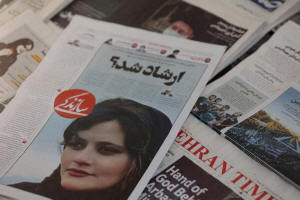Videos showing Iranian crackdown on protesters go viral as anger grows
 Send a link to a friend
Send a link to a friend
 [November 02, 2022]
DUBAI (Reuters) - Videos on
social media showing Iranian security forces severely beating protesters
have gone viral as anger grows at a widening crackdown with arrests of
prominent figures from rappers to economists and lawyers aimed at ending
seven weeks of unrest. [November 02, 2022]
DUBAI (Reuters) - Videos on
social media showing Iranian security forces severely beating protesters
have gone viral as anger grows at a widening crackdown with arrests of
prominent figures from rappers to economists and lawyers aimed at ending
seven weeks of unrest.
Protests ignited by the death in police custody of Mahsa Amini on Sept.
16 after her arrest for inappropriate attire have shaken Iran's clerical
establishment with people from all layers of society demanding wholesale
political change.
The nationwide demonstrations which have called for the death of Supreme
Leader Ayatollah Ali Khamenei are posing one of the boldest challenges
since the 1979 Islamic Revolution.
Iranian leaders have blamed the crisis on the United States and other
Western powers, a narrative few Iranians believe.
Khamenei said on Wednesday that U.S. officials who support protests are
"shameless", state media reported.
"Those who think the U.S. is an untouchable power are wrong," Khamenei
said. "It is completely vulnerable as seen with current events."
Defying a harsh warning by the chief of the widely feared elite
Revolutionary Guards, Iranians have risked their lives and arrest by
remaining in the street despite a bloody crackdown.

One video dated Oct. 22 that went viral on social media showed a dozen
riot police beating a man at night on a street in southern Tehran. One
of the officers on a motorbike ran him over then another shot him at
close range. Reuters could not verify the authenticity of the footage.
"This shocking video sent from Tehran today is another horrific reminder
that the cruelty of Iran's security forces knows no bounds," Amnesty
International said on Twitter about the Oct. 22 video.
"Amid a crisis of impunity, they're given free rein to brutally beat &
shoot protesters. @UN_HRC must urgently investigate these crimes."
Other videos of the beating of protesters, which Reuters has been unable
to verify, have also spread online.
[to top of second column]
|

A newspaper with a cover picture of
Mahsa Amini, a woman who died after being arrested by Iranian
morality police is seen in Tehran, Iran, September 18, 2022. Majid
Asgaripour/WANA (West Asia News Agency) via REUTERS/File Photo

Iran's police issued a communique on Tuesday saying that a special
order was issued to examine the details of a video showing police
officers beating a citizen, without giving any detail on the video
in question.
"The police does not approve of harsh and unconventional treatment,
the offending police officers will certainly be dealt with according
to the law," the statement read, according to Tasnim news agency.
The activist HRANA news agency said around 300 people had been
killed in the unrest, including 46 minors. Iran said at least 36
members of the security forces were also killed.
Some 14,160 people have been arrested, including about 300 students,
in protests in 133 cities and towns, and 129 universities, it said.
The crisis has hit Iran's currency. The U.S. dollar was selling for
as much as 342,600 rials on the unofficial market on Wednesday,
losing nearly 7% of its value since the protests started, according
to Bonbast.com.
On Monday night, security forces went to the house of prominent
economist Davoud Souri and arrested him. The officers took his
laptop and mobile phone with them, and after his arrest, they
informed his family that he was at Evin prison, according to a
social media post that Reuters could not verify.
Iranian media published on Wednesday a video of the arrest of famous
Iranian rapper Toomaj Salehi, showing him blindfolded and saying he
did not mean what he had said in previous comments critical of the
authorities.
He was detained following his release of several rap clips in
support of the protests.
(Writing by Michael Georgy; Editing by Nick Macfie)
[© 2022 Thomson Reuters. All rights
reserved.]
This material may not be published,
broadcast, rewritten or redistributed.
Thompson Reuters is solely responsible for this content.
 |